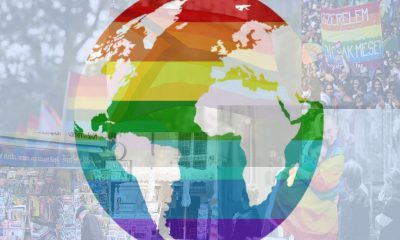World
Budapest Pride takes place amid Hungary LGBTQ rights crackdown
City’s mayor among parade participants
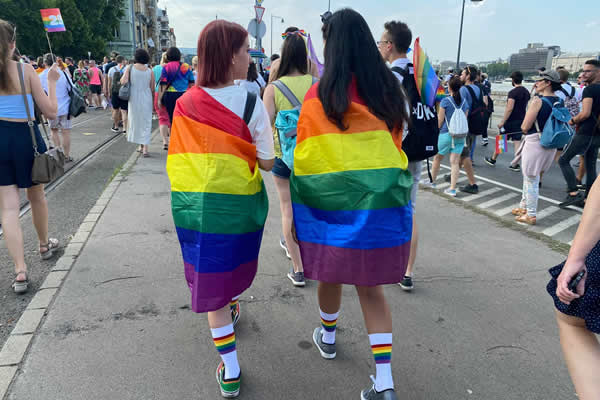
BUDAPEST, Hungary — Thousands of people attended a Pride parade in the Hungarian capital of Budapest on Saturday that took place against the backdrop of the government’s ongoing efforts to curtail LGBTQ rights.
Budapest Mayor Gergely Karacsony, who is challenging Prime Minister Viktor Orbán in next year’s presidential election, is among those who participated in the Budapest Pride parade. Event organizers said upwards of 30,000 people took part.
“There were a lot of supporters and allies, lots of young people and some older people,” one Budapest Pride participant told the Los Angeles Blade.
The participant said someone shouted an anti-gay slur at them and their friends as they walked home while holding a rainbow flag. They said the parade was nevertheless peaceful.
“The mood was more like a protest, solidarity and marching for equal rights than a party,” they told the Blade. “I didn’t see drag queens and it felt a bit muted, but I’m happy we had such a peaceful and fun Pride.”
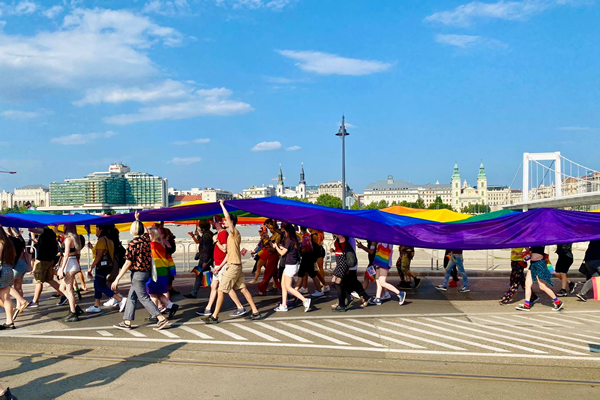
Budapest Pride took place less than a week after Prime Minister Viktor Orbán announced he wants to hold a referendum on a new law that bans the promotion of homosexuality and sex-reassignment surgery to minors in the country.
The law took effect on July 8. The European Commission a week later announced it would take legal action against Hungary.
Hungarian lawmakers late last year amended the country’s constitution to define family as “based on marriage and the parent-child relation” with “the mother is a woman, the father a man” and effectively banned same-sex couples from adopting children. The Hungarian Parliament in April 2020 approved a bill that bans transgender and intersex people from legally changing their gender.

Pope Francis died on Monday at his official residence at the Vatican. He was 88.
Cardinal Kevin Farrell, the Vatican camerlengo, said Francis passed away at Casa Santa Marta at 7:35 a.m. local time (1:35 a.m. ET.)
“His entire life was dedicated to the service of the Lord and of his church,” said Farrell. “He taught us to live the values of the Gospel with fidelity, courage, and universal love, especially in favor of the poorest and most marginalized. With immense gratitude for his example as a true disciple of the Lord Jesus, we commend the soul of Pope Francis to the infinite merciful love of the one and triune God.”
Francis, a Jesuit who was previously known as Jorge Mario Bergoglio, was born in Buenos Aires to Italian immigrant parents in 1936. He became archbishop of the Argentine capital in 1998.

Pope John Paul II in 2001 appointed him cardinal. The College of Cardinals in 2013 elected Francis to succeed Pope Benedict XVI after he resigned.
Francis vehemently opposed Argentina’s marriage equality law that then-President Cristina Fernández de Kirchner signed in 2010. Francis as pope backed civil unions for gays and lesbians and in 2023 said priests can bless same-sex couples.
Francis in 2023 said laws that criminalize homosexuality are “unjust.” He appointed Robert McElroy, an LGBTQ+-friendly cardinal from San Diego, as the new archbishop of Washington.
The pontiff in 2015 met with a group of gay, transgender, and HIV-positive prisoners in the Italian city of Naples. A Vatican charity in 2020 gave money to a group of trans sex workers in Italy who were struggling to survive during the COVID-19 pandemic.
Francis last October met with a group of trans and intersex Catholics and LGBTQ+ allies at the Vatican. GLAAD President Sarah Kate Ellis and Juan Carlos Cruz, a gay Chilean man who is a clergy sex abuse survivor, are among those who also met with Francis during his papacy.
Church teachings on homosexuality and gender identity, however, did not change under his papacy.
“From the early months of his papacy when he uttered the now-iconic ‘Who am I to judge?’ in response to a question about accepting gay priests, through numerous affirming pastoral messages to individual LGBTQ+ people, to his support for civil unions, and his condemnation of criminalization laws, Pope Francis has changed the church irreversibly by allowing people to see how their Catholic faith requires acceptance and equality,” said Francis DeBernardo, executive director of New Ways Ministry, a Mount Rainier, Md., based LGBTQ+ Catholic advocacy organization, in a statement.
DignityUSA Executive Director Marianne Duddy-Burke met Francis in 2023.
The group in a statement acknowledged the pontiff’s “legacy on LGBTQ+ issues is complicated,” noting “even with the recognition of so many positive words and actions, church teachings and even some recent Vatican documents remain problematic.” DignityUSA President Meli Barber nevertheless praised Francis.
“We also recognize that Pope Francis has raised awareness of LGBTQ+ issues in our church in truly unprecedented ways,” said Barber. “He spoke about us using our own terms and made a point of being seen meeting with LGBTQ+ people frequently. This sent a message of recognition and inclusion we never experienced from the Vatican before.”
Pope’s legacy is ‘mixed’
Activists in Argentina and around the world also mourned Francis.
“We mourn his death and embrace the people who are suffering today because of his passing,” LGBT Federation of Argentina President María Rachid told the Washington Blade.
Dindi Tan, national president of LGBT Pilipinas in the Philippines, on her Facebook page wrote Francis “was unafraid to challenge age-old dogmas and to ‘rattle’ the cage.” Pedro Julio Serrano, president of the Puerto Rico LGBTQ+ Federation, said Francis was an “ally of equity, humanity and dignity of LGBTQ+ people, not only during his pontificate, but throughout his life.”
Peter Tatchell, a long-time LGBTQ+ activist from the U.K. who is director of the Peter Tatchell Foundation, in a statement acknowledged Francis’s “more compassionate tone towards sexual minorities” that includes blessings for same-sex couples. Tatchell, nevertheless, pointed out the Vatican under Francis’s papacy continued to oppose marriage equality and trans rights.
“The Catholic Church remains a force for discrimination and suffering,” said Tatchell. “Under his leadership, the Vatican continued to oppose same-sex marriage and trans rights. Catholic bishops lobbied against the decriminalization of homosexuality in many parts of the world. The Vatican still upholds the homophobic edicts of the Catechism, which denounces the sexual expression of same-sex love as a ‘grave depravity’ and ‘intrinsically disordered.’ Francis’s legacy is, therefore, a mixed one — offering some progress but leaving deep-rooted inequalities largely intact.”
Vance met with Francis on Easter Sunday
Francis earlier this year spent more than a month in a Rome hospital after he developed double pneumonia.

He met with Vice President JD Vance at the Vatican on Easter Sunday, hours before his death.
The pope had previously criticized the Trump-Vance administration over its immigration policies.
“I just learned of the passing of Pope Francis,” said Vance on X after the Vatican announced Francis’s death. “My heart goes out to the millions of Christians all over the world who loved him.”
I just learned of the passing of Pope Francis. My heart goes out to the millions of Christians all over the world who loved him.
I was happy to see him yesterday, though he was obviously very ill. But I’ll always remember him for the below homily he gave in the very early days…
— JD Vance (@JDVance) April 21, 2025
Argentine President Javier Milei, who previously criticized Francis, mourned him in a statement he posted to X. Milei also announced Argentina will observe seven days of mourning.
“It is with profound sorrow that I learned this sad morning that Pope Francis, Jorge Bergoglio, passed away today and is now resting in peace,” said Milei. “Despite differences that seem minor today, having been able to know him in his goodness and wisdom was a true honor for me.”
“As president, as an Argentine, and, fundamentally, as a man of faith, I bid farewell to the Holy Father and stand with all of us who meet today with this sad news,” he added.
ADIÓS
Con profundo dolor me entero esta triste mañana que el Papa Francisco, Jorge Bergoglio, falleció hoy y ya se encuentra descansando en paz. A pesar de diferencias que hoy resultan menores, haber podido conocerlo en su bondad y sabiduría fue un verdadero honor para mí.… pic.twitter.com/3dPPFoNWBr— Javier Milei (@JMilei) April 21, 2025
Brazil
US lists transgender Brazilian congresswoman’s gender as ‘male’ on visa
Erika Hilton has represented São Paulo since 2022

A transgender Brazilian congresswoman says the U.S. issued her a visa that listed her gender as “male.”
Erika Hilton on Wednesday wrote on her Instagram page that she requested a visa that would have allowed her to travel to the U.S. in order to participate in the Brazil Conference at Harvard University and the Massachusetts Institute of Technology.
The conference took place earlier this month.
“I was classified as ‘male’ by the U.S. government when I went to get my visa,” wrote Hilton, who added a visa she received from the U.S. in 2023 listed her gender as “female.”
Hilton is a Black travesti and former sex worker from São Paulo who won a seat in the Brazilian Congress in 2022. The Washington Blade spoke with Hilton shortly after her election.
“It is a big responsibility … but I feel very honored,” said Hilton. “I very much like to be able to be a representative for my people, and the more than 250,000 people who voted for me have confidence in me,” she said after she spoke at a rally in support of now Brazilian President Luiz Inácio Lula da Silva in a São Paulo square. “This demonstrates that our work has the potential to have a gigantic reach; where we can advance efforts to end death, poverty, misery, genocide that we have.”
President Donald Trump in his inaugural speech announced the federal government’s “official policy” is “there are only two genders, male and female.” The Trump-Vance administration has also banned the State Department from issuing passports with “X” gender markers.
Germany and Denmark are among the countries that have issued travel advisories for trans and nonbinary people who plan to visit the U.S. These warnings come ahead of WorldPride, which is scheduled to take place in D.C. from May 17-June 8.
Hilton said she is “not surprised” the U.S. issued her a visa with a male gender marker.
“I’m also not surprised by the level of hatred and fixation these people have with trans people,” she said. “After all, the documents I presented are rectified, and I’m registered as a woman, even on my birth certificate.”
Hilton further accused the U.S. of “ignoring official documents from other sovereign nations, even from a diplomatic representative.”
“At the end of the day, I’m a Brazilian citizen, and my rights are guaranteed and my existence is respected by our own constitution, legislation, and jurisprudence,” she said.
Editor’s note: Duda Salabert, another transgender Brazilian congresswoman, also said the U.S. listed her gender as “male” on her American visa.
Myanmar
LGBTQ+ advocacy group joins Myanmar earthquake relief effort
March 28 quake killed thousands, devastated country’s second-largest city

A powerful earthquake that rocked Myanmar on March 28 unleashed devastation across the central part of the country.
The U.S. Geological Survey measured the quake at 7.7, and pinpointing its epicenter roughly 10 miles west of Mandalay, the country’s second-largest city. A 6.4-magnitude aftershock jolted the area 12 minutes later, compounding the destruction and deepening the crisis for a nation already strained by conflict.
The earthquake struck with terrifying intensity near its epicenter, wreaking havoc on Mandalay and the nearby city of Sagaing.
Mandalay, a bustling city of approximately 1.5 million residents, bore the brunt of the destruction. Among the most striking losses was the 12-story Sky Villa Condominium, which collapsed, leaving scores trapped beneath the wreckage. Rescue workers scrambled to pull survivors from the rubble, but the rising death toll underscored the tragedy’s magnitude.
In Sagaing, which is located closer to the epicenter, more than 70 percent of buildings sustained damage. The Ava Bridge, an essential artery spanning the Irrawaddy River, collapsed, cutting off a critical connection to Mandalay. The earthquake’s shallow depth of less than seven miles amplified its power, reducing homes, temples, and schools to rubble.
The earthquake’s death toll continues to climb, with at least 3,649 confirmed dead, more than 5,000 injured, and approximately 145 people missing. Amid the widespread devastation, questions loom about the impact on vulnerable populations. The Los Angeles Blade reached out to Colors Rainbow, an organization advocating for LGBTQ+ rights in Myanmar, to understand how the crisis has affected one of the nation’s most marginalized communities.
Colors Rainbow Executive Director Hla Myat Tun spoke about how his organization is working to address the crisis faced by Myanmar’s LGBTQ+ community in the aftermath of the earthquake.
Colors Rainbow has implemented a system of multipurpose cash transfers, directing funds to local LGBTQ+ partner organizations. These grassroots partners, in turn, provide essential support to affected individuals that includes emergency cash assistance, food, non-food items, clean water, and basic emotional support tailored to the immediate needs of their communities.
“We estimate that around 500–800 LGBTQ individuals have been impacted in the affected areas, particularly in Mandalay Region, Sagaing Region, and southern Shan state,” said Hla Myat Tun. “So far, we have been able to directly assist around 80–100 LGBTQ individuals.”
Hla Myat Tun told the Blade that Colors Rainbow is actively gathering data to assess the specific challenges that LGBTQ+ people are facing in the aftermath of the earthquake.
Preliminary observations, he noted, point to heightened vulnerability among LGBTQ+ people, driven by social exclusion and limited access to mainstream humanitarian aid. Hla Myat Tun, however, emphasized more comprehensive information is necessary to fully understand the scope of their needs and vulnerabilities in this crisis.
“We are partnering with international LGBTQ and feminist organizations that focus on displaced communities,” said Hla Myat Tun. “These partners provide emergency funds, and we coordinate with local LGBTQ groups to deliver aid directly to affected individuals on the ground.”
Addressing reports of military restrictions on humanitarian aid, Hla Myat Tun explained how Colors Rainbow is managing to reach LGBTQ+ people who are in conflict zones and areas the military junta controls. Hla Myat Tun highlighted the importance of the organization’s trusted local LGBTQ+ partners, who are embedded in these regions. Their presence and established networks, he said, are vital in navigating restricted areas and ensuring that aid reaches the LGBTQ+ people who are most in need.
Hla Myat Tun also provided insight into how Colors Rainbow is tailoring its relief efforts to meet the LGBTQ+ community’s specific needs.
He said his organization is gathering information directly from LGBTQ+ people through close coordination with its local partners, relying on both formal and informal communication channels. Hla Myat Tun told the Blade his team conducts daily check-ins via quick telephone calls, ensuring a continuous flow of information to guide their response efforts despite limited internet access, electricity and other challenges.
“Our approach is collaborative — we set strategies and share responsibilities to respond flexibly and safely, based on the rapidly changing local context,” he said. “Personal stories are being documented, but for security reasons, we are cautious about sharing them publicly.”
When asked whether staff or volunteers had harassment, discrimination, or violence while delivering aid — a concern given the precarious legal and social climate for LGBTQ+ people in Myanmar — Hla Myat Tun said there have been no reported incidents thus far.
“So far, we haven’t received any reports from our staff or local partners about harassment or violence while delivering aid,” he noted, emphasizing Colors Rainbow remains vigilant and has implemented robust safety protocols to protect all involved.
Colors Rainbow relies primarily on funding from international LGBTQ+-focused partners. He noted, however, humanitarian funding specifically dedicated to LGBTQ+ communities remains vastly under-resourced, relative to the pressing needs on the ground. Hla Myat Tun said this shortfall severely limits the scale and reach of Colors Rainbow’s efforts.
“While Myanmar’s legal framework remains outdated, societal attitudes — especially during the civilian government — have shown signs of progress,” said Hla Myat Tun. “We have seen positive change thanks to the work of local LGBTQ organizations.”
“In the current crisis, many communities are working together despite legal barriers. However, in areas without LGBTQ-led organizations, inclusive humanitarian responses are still lacking,” he added. “There’s an urgent need for international humanitarian actors to understand and implement LGBTQ-inclusive practices in Myanmar.”
When asked about long-term strategies to support the recovery and resilience of LGBTQ+ communities as Myanmar rebuilds, Hla Myat Tun affirmed Colors Rainbow is deeply committed to fostering resilience. The organization’s initiatives include leadership development, community empowerment through training and workshops, sub-granting programs, and organizational development support. He also highlighted Colors Rainbow’s advocacy for LGBTQ+-inclusive policies and collaboration with ethnic groups to promote an inclusive federal democracy, and specifically thanked Outright International, a global LGBTQ+ and intersex rights group, for “amplifying our work.
“This kind of international attention shines a spotlight on the challenges LGBTQ communities in Myanmar are facing and helps open doors for more support,” Hla Myat Tun told the Blade. “It also boosts visibility and solidarity, both locally and globally, which we deeply appreciate.”
Argentina
Argentina’s transgender community confronts ‘chaotic, desperate’ situation
President Javier Milei has implemented several anti-trans directives

Editor’s note: Washington Blade International News Editor Michael K. Lavers will be on assignment in Argentina through April 12.
BUENOS AIRES, Argentina — A group of Argentine transgender activists with whom the Blade spoke on April 4 said President Javier Milei’s policies have made their community even more vulnerable to violence, discrimination, and poverty.
“The situation is really chaotic, desperate,” said Florencia Guimares García, a travesti activist who is president of the House of Lohana and Diana Civil Association. “There is also a lot of fear among the trans and travestí community towards the government’s policies.”
Guimares’s group is named after Diana Sacayán, a prominent trans activist who was stabbed to death inside her Buenos Aires apartment in 2015, and Lohana Berkins, the founder of the Association for the Fight for Travesti and Transsexual Identity who died in 2016.
Guimares and three other trans activists — Julia Amore, Sasha Solano, and Daniela Ruiz — spoke with the Blade after they participated in a trans and travestí rights forum that took place at an LGBTQ cultural center in downtown Buenos Aires. Alba Rueda, the country’s former special envoy for LGBTQ rights, also took part.
“We are in a bad moment for the rights and quality of life of LGBTQ+ people,” Rueda told the Blade during a February 2024 interview.

Milei took office on Dec. 10, 2023, after he defeated then-Economy Minister Sergio Massa in the second round of that year’s Argentina’s presidential election. Rueda resigned before Milei assumed the presidency.
Milei, an economist and former congressman, shortly after he took office eliminated the country’s Women, Gender and Diversity Ministry.
Milei last year closed the National Institute Against Discrimination, Xenophobia and Racism, a government agency known by the acronym INADI that provided support and resources to people who suffered discrimination based on sexual orientation, gender identity, and other factors. Milei in 2024 also dismissed trans people who the government hired under the Trans Labor Quota Law, which set aside at least 1 percent of public sector jobs for trans people.
Argentina’s landmark Gender Identity Law that, among other things, allows trans and nonbinary people to legally change their gender without medical intervention, took effect in 2012 when Cristina Fernández de Kirchner was president. Milei on Feb. 5 issued a decree that restricts minors’ access to gender-affirming surgeries and hormone treatments.
Gay Congressman Esteban Paulón, a long-time LGBTQ activist, filed a criminal complaint against Milei after he linked the LGBTQ community to pedophilia and made other homophobic and transphobic comments during a Jan. 23 speech at the World Economic Forum in Davos, Switzerland. Millions of people in Buenos Aires and across Argentina participated in marches against Milei that took place less than two weeks later.

Milei is among the heads of state who attended President Donald Trump’s inauguration. Milei also spoke at this year’s Conservative Political Action Conference in National Harbor, Md.
“Violence is more explicit, more common,” Guimares told the Blade, noting police violence has become more common against sex workers who are trans or travestí since Milei took office. Guimares added this situation is worse outside of Buenos Aires.
“The situation is different, depending on the location, and even more so in other provinces,” she said. “Even living in the province of Buenos Aires isn’t the same as living in Salta, or in Jujuy, or in Corrientes, or in provinces where the population is more conservative, where the discourse from the churches is much stronger, where all of this has a much crueler impact.”
“Milei’s discourse has legitimatized all of this,” added Guimares.
Amore said Argentina before Milei “had been a beacon” for human rights around the world.
“We’ve been building these laws with a lot of struggle, a lot of effort, with allies, and it wasn’t enough because we didn’t reach our goal,” she said. “These are very young. Our democracy is very young; we have a 40-year-old democracy and we are talking about a Gender Identity Law that is 12-years-old.
Amore added Milei is trying to erase trans and travestí people. Ruiz, an activist and actress who founded Siete Colores Diversidad, agreed.
“It is a cultural battle for us,” Ruiz told the Blade, referring for the continued struggle for trans and travestí rights in Argentina.
“It marks a cultural paradigm shift that we were carrying out day after day, making ourselves visible,” she added. “We carried it out by making ourselves politically visible, by presenting our travestí and trans Latin American visibility as a beacon to the world.”
The activists spoke with the Blade less than three months after Trump took office.
The American president, like Milei, has targeted the trans community with executive orders and policy directives. These include banning the State Department from issuing passports with “X” gender markers and prohibiting trans adults and young people from sports teams that correspond with their gender identity.
Solana, a trans woman from Peru who advocates on behalf of migrants, noted one of the first executive orders that Trump signed directed the federal government to only recognize two genders: Male and female.
“Man and woman. Period,” she said.
Guimares added Milei’s anti-LGBTQ discourse isn’t even his “original speech, but rather a line drawn from the U.S. government of Donald Trump and its agenda, which he established from the beginning and which he campaigned on as well.”
“This also follows in line with parties like Vox in Spain and other European countries, where we see how in Hungary, where an LGBTI Pride march (in Budapest) is now banned, and in other countries around the world where the population is having a really hard time,” said Guimares. “So, it’s not something original from Milei, but rather he’s taking part in those political agendas to generate strategies and alliances to be able to access economic resources.”
Amore, for her part, urged her American counterparts to continue the fight.
“Don’t let down your guard,” said Amore. “Organize. Come together. Speak out. Become visible in community. Respect the diversity of voices and put your own voices first and make yourselves more visible.”
India
LGBTQ+ poets included in India’s premier literary festival
Sahitya Akademi seen as mirror of government’s cultural agenda

India’s premier literary institution on March 7 announced it would allow LGBTQ+ poets to participate in its marquee Festival of Letters in New Delhi.
The Sahitya Akademi, often seen as a mirror of the government’s cultural agenda, for the first time allowed these poets into a high-profile poetry reading at the Rabindra Bhavan. They shared the stage with more than 700 writers across 50 languages.
Culture and Tourism Minister Gajendra Singh Shekhawat kicked off the Festival of Letters with Mahesh Dattani, the acclaimed English-language playwright famed for his provocative works, as the main guest. Dubbed Asia’s grandest literary gathering, the Sahitya Akademi took place over six days under the “Indian Literary Traditions” theme.
The 2025 Festival of Letters showcased a sweeping range of voices — young writers, women writers, Dalit authors from marginalized castes, Northeast Indian scribes, tribal poets, and LGBTQ+ poets — cementing its reputation as a literary kaleidoscope.
Kalki Subramaniam, a leading transgender rights activist and author, on March 9 chaired a literary session titled “Discussion on Literary Works of LGBTQ Writers in the 21st Century,” which spotlighted contemporary queer voices.
“It was enriching to listen to the profound thoughts of LGBT writers from various parts of the country in their speeches,” said Subramaniam. “The session was particularly memorable with the participation of A. Revathi Amma from Tamil Nadu, Reshma Prasad from Bihar, Sanjana Simon from New Delhi, and Devika Devendra Manglamukhi and Shivin from Uttar Pradesh and Aksaya K Rath from Orissa.”
Subramaniam discussed how global politics shape gender rights and the persistent erasure of trans identity, urging a unified push for solidarity within the LGBTQ+ community. She stressed the vital need to elevate queer works and writers, casting their voices as essential to the literary vanguard.
“It was a pleasure to meet great writers from around the country in the festival as well as meet my writer activist friends Sajana Simon and Revathi Amma after a long time,” said Subramaniam.

The government on March 12, 1954, formally established the Sahitya Akademi. A government resolution outlined its mission as a national entity tasked with advancing Indian literature and upholding rigorous literary standards; a mandate it has pursued for seven decades.
The Sahitya Akademi in 2018 broke ground in Kolkata, hosting the country’s first exclusive gathering of trans writers, a landmark nod to queer voices in Indian literature.
Hoshang Dinshaw Merchant, India’s pioneering openly gay poet and a leading voice in the nation’s gay liberation movement, on March 9 recited a poem at the Festival of Letters, his verses carrying the weight of his decades-long quest for queer recognition. He later thanked the session’s chair for welcoming the community, a gesture that underscored the event’s third day embrace of diverse voices.
The Sahitya Akademi in 2024 honored K. Vaishali with the Yuva Puraskar for her memoir “Homeless: Growing Up Lesbian and Dyslexic in India,” a raw account of navigating queerness and neurodivergence. Vaishali in a post-win interview reflected on India’s deep-seated conservatism around sexuality, noting she wrote from a place of relative safety — an upper-caste privilege that shielded her as she bared her truth. The award, she said, was the Akademi’s indelible seal on her lived experience, a validation no one could challenge.
The Sahitya Akademi’s inclusion of LGBTQ+ writers in its main program this year jars with the Bharatiya Janata Party-led government’s conservative stance, which, in 2023, opposed same-sex marriage in the Supreme Court, arguing it erodes Indian family values. Yet, under Shekhawat, the Sahitya Akademi’s spotlight on queer voices at the Rabindra Bhavan suggests it could be a tentative crack in a regime typically rooted in tradition.
The Festival of Letters hosted a translators’ meeting on March 10, spotlighting P. Vimala’s 2024 award-winning Tamil translation of Nalini Jameela’s “Autobiography of a Sex Worker,” a work steeped in marginalized voices that include queer perspectives.
This platform gained significant support from the BJP-led government, with Shekhawat securing a 15 percent budget increase to ₹47 crore ($5.63 million) in 2024. In Tamil Nadu state, however, Dravida Munnetra Kazhagam’s Chief Minister Muthuvel Karunanidhi Stalin, has long opposed such cross-linguistic efforts, fearing dilution of Tamil identity amid decades of anti-Hindi sentiment — a tension the Sahitya Akademi’s inclusive showcase sought to bypass.
‘The Akademi is very inclusive and has a friendly festival ambience,” Subramaniam told the Los Angeles Blade.
Japan
Japan’s marriage equality movement gains steam
Nagoya High Court this month ruled lack of legal recognition is unconstitutional
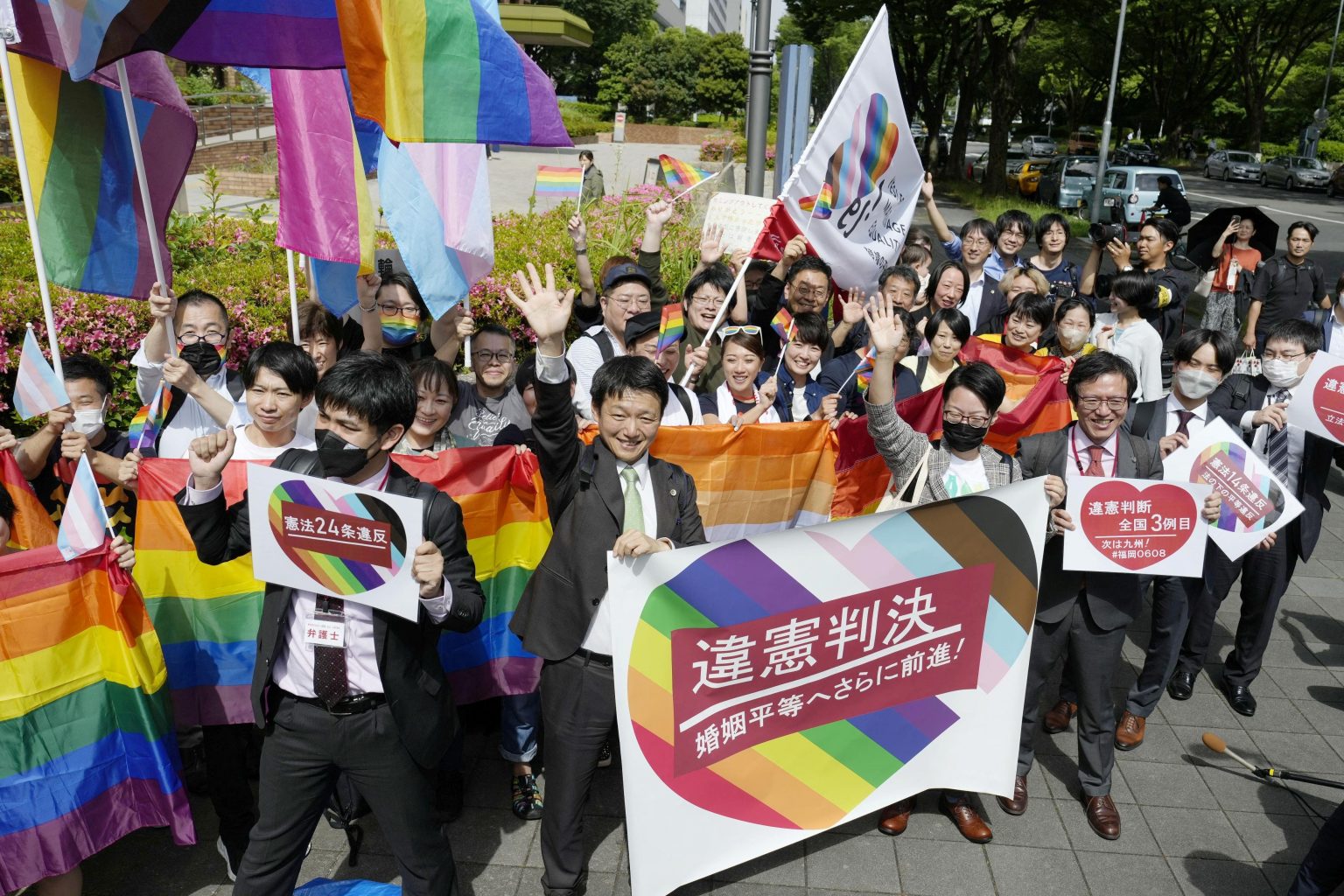
Japan’s Nagoya High Court on March 7 ruled the lack of legal recognition of same-sex marriages violates the country’s constitution.
The plaintiffs argued Japan’s Civil Code and Family Registration Act, which does not recognize same-sex marriages, violates the country’s constitution. They cited Article 14, Paragraph 1, which guarantees equality under the law and prohibits discrimination based on factors that include race, creed, sex, or social status. The plaintiff also invoked Article 24, Paragraph 2, which emphasizes that laws governing marriage and family matters must uphold individual dignity and the fundamental equality of the sexes.
The plaintiffs sought damages of 1 million yen ($6,721.80) under Article 1, Paragraph 1, of the State Redress Act, which provides for compensation when a public official, through intentional or negligent acts in the course of their duties, causes harm to another individual. The claim centered on the government’s failure to enact necessary legislation, which prevented the plaintiff from marrying.
The court noted same-sex relationships have existed naturally long before the establishment of legal marriage. It emphasized that recognizing such relationships as legitimate is a fundamental legal interest connected to personal dignity, transcending the confines of traditional legal frameworks governing marriage and family.
The court further observed same-sex couples encounter significant disadvantages in various aspects of social life that cannot be addressed through civil partnership systems. These include housing challenges, such as restrictions on renting properties, and financial institutions refusing to recognize same-sex couples as family members for mortgages. Same-sex couples also face hurdles in accessing products and services tailored to family relationships. While the court deemed the relevant provisions unconstitutional, it clarified that the government’s failure to enact legislative changes does not constitute a violation under the State Redress Act.
The lawsuit, titled “Freedom of Marriage for All,” brought together a large coalition of professionals, including more than 30 plaintiffs and 80 lawyers. They filed six lawsuits in five courts throughout Japan.
“We filed these lawsuits on Valentine’s Day, Feb. 14, 2019, in Tokyo, Osaka, Nagoya, and Sapporo, and in September of that year in Fukuoka,” noted Takeharu Kato, director of Marriage for All Japan. “Then, in March 2021, the Sapporo District Court handed down the first ruling declaring the current laws unconstitutional, which received extensive worldwide media coverage. Subsequently, the Osaka District Court unfortunately ruled that the current law is constitutional, but among the 10 rulings handed down so far, nine have ruled that not recognizing marriage equality is unconstitutional.”
Kato is a lawyer who is part of the legal team in the Sapporo case. He is also a board member of Marriage for All Japan, a marriage equality campaign.
“The MFAJ (Marriage for All Japan) is fully supporting the lawsuits by publicizing the current status of the trials and the rulings in our websites and social networks, setting up press conferences at the time of the rulings,” Kato told the Los Angeles Blade. “We also make the best of the impact of the lawsuits in our campaign by holding events with the plaintiffs of the lawsuits and inviting them to the rally at Diet (the Japanese parliament) members’ building.”
Kato said the campaign has significantly shifted public opinion, with recent polls indicating more than 70 percent of Japanese people now support marriage equality — up from approximately 40 percent before Marriage for All Japan launched. He also noted 49 percent of Diet members now back marriage equality.
Japan is the only G7 country that does not legally recognize same-sex couples. Taiwan, Nepal, and Thailand have extended full marriage rights to gays and lesbians.
Expressing disappointment, Kato said many Japanese politicians continue to resist marriage equality, despite overwhelming public support. Kato added Marriage for All Japan expects the Supreme Court to rule on their lawsuits in 2016.
“We believe that the Supreme Court will also rule that the current laws are unconstitutional,” he said. “However, the Supreme Court’s ruling alone is not enough to achieve marriage equality under the Japanese legal system. We should put more and more strong pressure on the Diet to legalize marriage equality in Japan as soon as possible.”
Several municipalities and prefectures issue certificates that provide limited benefits to same-sex couples, but they fall short of equal legal recognition.
Prime Minister Fumio Kishida’s government has faced mounting pressure on the issue as public support for marriage equality has surged in recent years. Kishida has yet to push reforms within his own party; encountering fierce opposition from its traditional leadership.
His government in June 2023 passed Japan’s first law addressing sexual orientation and gender identity, aiming to “promote understanding” and prevent “unfair discrimination.” Activists, however, widely criticized the legislation on grounds it fails to provide comprehensive protections or extend marriage rights to same-sex couples.
Chile
2024 was ‘year of regression’ for LGBTQ+ rights in Chile
Advocacy group blamed rise in ultra-right, government inaction

A report that a Chilean advocacy group released on Tuesday says 2024 was a “year of regression” for LGBTQ+ rights.
The Movement for Homosexual Integration and Liberation (Movilh)’s 23rd Sexual and Gender Diversity Human Rights report notes LGBTQ+ rights for the first time since democracy returned to Chile in 1990 not only stopped advancing, but saw significant rollbacks in the three branches of government.
The Movilh report describes 2024 as “the year of regression,” noting 23.5 percent of human rights violations against LGBTQ+ people over the last two decades occurred last year. A total of 2,847 discrimination complaints were reported in 2024, representing a 78.7 percent increase over the previous year.
The report documents two murders, 44 physical or verbal assaults, two incidents of violence in police stations, 89 reports of abuse in the workplace, and 65 incidents in educational institutions in 2024. The transgender community was particularly affected, with a 462.6 percent increase in discrimination cases compared to 2023.
The Movilh report notes the growing influence of the ultra-right, whose narratives have fostered hate speech, is one of the main factors behind the deterioration of LGBTQ+ rights in Chile. The advocacy group also criticizes authorities who have remained silent in the face of these attacks, even though they say they support the LGBTQ+ community.
The report specifically singles out the Executive Branch.
Movilh specifically highlights the prohibition of public funds for hormone treatments for trans minors and the postponement of these procedures in public hospitals. The government reversed course after intense pressure and judicial appeals.
The report also criticizes the judiciary.
The Oral Criminal Trial Court of San Antonio refused to classify the murder of a trans woman as a femicide, arguing her identity card still reflected the gender assigned to her at birth. The Court of Appeals of Santiago also ordered the removal of a homophobia complaint on social media, setting what NGOs have described as a dangerous freedom of speech precedent.

The report notes Valparaíso, Metropolitana, and Biobío are the three regions with the highest number of discrimination complaints, with 51.3 percent, 25.1 percent, and 5.8 percent respectively. Reported cases increased in 11 of Chile’s 16 regions, with Ñuble leading the way with a 300 percent increase.
Faced with this bleak panorama, advocacy groups have intensified their efforts to denounce the violence and demand LGBTQ+ rights are once again guaranteed. Movilh, along with other organizations, have approached the Inter-American Commission on Human Rights and the U.N. about the situation in Chile.
“We are seeing a reversal of rights that cost decades of struggle,” warns the report. “If the State does not act urgently, we run the risk of discrimination and violence becoming institutionalized.”
Kenya
Kenyan president defends Trump executive order on two genders
Advocacy groups criticized William Ruto’s Jan. 26 comments

Kenyan President William Ruto is facing backlash for backing U.S. President Donald Trump’s executive order that recognizes only two genders: Male and female.
Ruto’s support for Trump’s decision to ban transgender people from serving in the U.S. military and competing on women’s sports teams has drawn criticism from human rights defenders, lawmakers, lawyers, and intersex activists.
Ruto’s critics cite Kenya’s 2022 landmark decision to officially recognize intersex people as the third gender with an “I” gender marker after years of court battles for recognition and their inclusion in a national Census for the first time in 2019.
“We are very proud that contrary to what has been happening in the past, this year we got some very welcoming developments in the United States that as a leading democracy, we have gotten to understand that the policy direction of the U.S. supports what we believe in,” Ruto stated during a Jan. 26 speech at the Global Cathedral Church’s annual convention in Nairobi. “Boys must remain boys, men must remain men, women must remain women and girls must remain girls.”
Ruto’s position to side with Trump on sex and gender identity contradicts his previous stance during the Biden-Harris administration when he was cautious about speaking about transgender and queer rights in order not to jeopardize his relationship with Washington.
Trump on Jan. 21 signed an executive order that directed the U.S. federal government to only recognize male and female genders. This directive revoked the Biden-era policy that recognized trans rights and allowed trans servicemembers.
Trump on Feb. 6 signed another executive order that bans trans athletes from competing on female sports teams
“The war on women’s sports is over,” he said.
“We’re putting every school receiving taxpayer dollars on notice that if you let men take over women’s sports teams or invade your locker rooms, you will be investigated for violations of Title IX and risk your federal funding,” Trump warned. “From now on, women’s sports will be only for women.”
His executive order relies partly on the U.S. Justice Department’s authority to bring enforcement actions under Title IX, which bars sex discrimination in education and requires schools to offer girls an equal opportunity to play sports. The law, under Trump’s interpretation, forbids trans girls from playing in girls’ sports.
Trump in 2017 banned trans people from serving openly in the U.S. military.
“We thank God that this year the first very news from the U.S. in the new administration is to confirm what the Bible says, what our faith believes in, and what our tradition firmly is grounded on,” Ruto said in his speech.
The Kenya National Commission on Human Rights (KNCHR), a government-funded body, described Ruto’s comments as “embarrassing and unfortunate.”
“In Kenya, the law is very clear and the Children’s Act recognizes the intersex because they are unique persons as they have no issues based on sex identity or gender orientation,” said an intersex rights activist who asked the Washington Blade to remain anonymous. “His sentiments are likely to increase stigma against the intersex persons and if they are discriminated against, anyone will just go to court because they are also protected by the law.”
Esther Passaris, an opposition MP who represents Nairobi County, maintained there are not two sexes in Kenya.
“Let’s face it, we have intersex children with two or incomplete sexes. These children require our love as a society,” she said. “Let God deal with the genders.”
Since the recognition of intersex people, several policy measures to tackle discrimination have been implemented to ensure their protection and equal treatment.
Kenya last week officially recognized intersex people at birth, allowing them to receive birth certificates with an “I” gender marker. The KNCHR described this decision as “a historic milestone” that aligns with the Kenyan constitution and other existing policy measures that include the Children Act and the proposed Intersex Persons Bill, 2024.
“This is a major step towards securing rights, dignity, and equal opportunities for all intersex persons in Kenya,” KNCHR stated.
KNCHR asked Kenyans, state, and non-state institutions to support awareness, policy reforms, and the inclusion of intersex people for the latest reform to be implemented successfully.
World
Suspension of US aid is ‘catastrophe’ for global LGBTQ+ rights movement
Washington funds third of international advocacy

The Trump-Vance administration’s decision to freeze nearly all U.S. foreign aid spending for at least 90 days has had a devastating impact on the global LGBTQ+ rights movement.
The Institute on Race, Equality and Human Rights, a Washington-based group that championed LGBTQ+ and intersex rights in Brazil and elsewhere in Latin America, on Feb. 1 announced it has suspended programming because it lost nearly 80 percent of its funding.
“Despite some limitations we are facing at the moment, we want to share that our commitment is unwavering,” said the organization in an email it sent to supporters on Wednesday. The message also asked them to make a donation.
Outright International, a global LGBTQ+ and intersex advocacy group, in a statement to the Los Angeles Blade said it has “had to halt direct funding and capacity-building support to LGBTIQ groups in more than 32 countries” in Africa, Asia, the Caribbean, and Latin America.
“The community-based groups we support with USAID (the U.S. Agency for International Development) funding carry out critical human rights, humanitarian and development work,” said Outright International. “This includes protecting community members from violence, providing skills training that allows LGBTIQ people to access employment and entrepreneurial opportunities, and essential services, including healthcare services.”
The LGBTQ+ Victory Institute works with Caribe Afirmativo in Colombia, Promsex in Peru, VoteLGBT in Brazil, and a number of other advocacy groups outside the U.S. LGBTQ+ Victory Institute President Elliot Imse told the Blade his organization has lost around $600,000, which is two-thirds of its entire global program budget.
“We’re scrambling to secure new funding to restore half of the amount we lost, which would allow us to make a similar impact on LGBTQ inclusion worldwide,” he said.
Equal Namibia and Namibia Pride received a $30,000 grant from USAID. Omar van Reenen, co-founder of Equal Namibia, told the Washington Blade it “was the largest grant and biggest grant on such a scale we have received.
“When we received this grant it was the first time we had substantial funding for our organization,” they said.
Van Reenen said the organizations have lost $10,000 of the original $30,000 they received from USAID.
“This means we do are back to zero funds for the organization and will need to continue our campaigns on a voluntary basis,” they told the Blade. “This comes at the worst time as we will need to challenge the new anti-same-sex marriage act passed by the president in October and the upcoming decriminalization case which the Supreme Court will hear soon.”
The Center for Integrated Training and Research, a group known by the Spanish acronym COIN that fights the HIV/AIDS epidemic in the Dominican Republic and in other countries in the Caribbean, on Feb. 6 said the funding freeze “directly affects the continuity of the free services that COIN provides to more than 2,300 patients who receive antiretroviral treatment” in the Dominican Republic.
COIN said its patients will continue to receive free antiretroviral drugs because the Dominican government provides them; but the funding freeze has forced it to suspend urology, internal medicine, and pediatric services. COIN said it will continue to provide vaccines and general medicine, gynecological, and family planning services, but “with limitations.” COIN also noted its PrEP service will continue, “but with reduced capacity.”
“In light of this situation, we urgently call upon the national and international community, strategic allies, and sectors sensitive to our cause to find solutions that allow us to continue offering these vital services,” said COIN. “The health and well-being of thousands of people depends on the solidarity and commitment of everyone.”
Secretary of State Marco Rubio on Jan. 24 directed State Department personnel to stop nearly all U.S. foreign aid spending for 90 days in response to an executive order that President Donald Trump signed after his inauguration. Rubio later issued a waiver that allows the President’s Emergency Plan for AIDS Relief and other “life-saving humanitarian assistance” programs to continue to operate during the freeze. (The Blade last week reported PEPFAR-funded programs in Kenya and other African countries have been forced to suspend services and even shut down because of a lack of U.S. funding. Dozens of HIV/AIDS activists on Feb. 6 protested outside the State Department and demanded U.S. officials fully restore PEPFAR funding.)
The Trump-Vance administration is also trying to dismantle USAID.
A statement the White House issued on Feb. 3 said the organization “has been unaccountable to taxpayers as it funnels massive sums of money to the ridiculous — and, in many cases, malicious — pet projects of entrenched bureaucrats, with next-to-no oversight.” The statement also contains examples of what it described as “the waste and abuse” that include:
• $1.5 million to “advance diversity equity and inclusion in Serbia’s workplaces and business communities”
• $47,000 for a “transgender opera” in Colombia
• $32,000 for a “transgender comic book” in Peru
• $2 million for sex changes and “LGBT activism” in Guatemala
The statement links to an article the Daily Mail published on Jan. 31 that President Donald Trump “strips millions from DEI foreign aid programs funding Irish musicals, LGBTQ programs in Serbia and more.” The claim that USAID paid for “sex changes and ‘LGBT activism’ in Guatemala” appears to come from an article the Daily Caller published on Sept. 19, 2024.
Sources with whom the Blade has spoken say the White House’s claims are incorrect.
Salvadoran President Nayib Bukele on Feb. 2 welcomed efforts to dismantle USAID.
“Most governments don’t want USAID funds flowing into their countries because they understand where much of that money actually ends up,” he wrote on X. “While marketed as support for development, democracy, and human rights, the majority of these funds are funneled into opposition groups, NGOs with political agendas, and destabilizing movements.”
Most governments don’t want USAID funds flowing into their countries because they understand where much of that money actually ends up.
While marketed as support for development, democracy, and human rights, the majority of these funds are funneled into opposition groups, NGOs… pic.twitter.com/bXpdK29zH5
— Nayib Bukele (@nayibbukele) February 2, 2025
Mónica Hernández, executive director of ASPIDH Arcoíris Trans, a transgender rights group in El Salvador, spoke with the Blade last week in San Salvador, the country’s capital. Posters with USAID’s logo were on the wall inside the organization’s office.
Hernández said she learned on Jan. 27 the U.S. had suspended funding that ASPIDH Arcoíris Trans received through Freedom House and other groups that partnered with the State Department. She told the Blade that Washington cancelled the grants the following day.
“The (challenge) is to look for other funds from another institution that is not USAID, or that is not from the United States that has to go through the State Department,” she said.

Outright International told the Blade that USAID is not it’s “only source of funding,” but noted “USAID, and the U.S. government more broadly, have in recent years become an extremely important source of funding for LGBTIQ rights around the world, allowing us and our partners to expand our efforts to promote inclusive development and combat pervasive human rights violations.”
Council for Global Equality Chair Mark Bromley told the Blade the U.S. funds roughly a third of the global LGBTQ+ rights movement. Imse said the global LGBTQ rights movement is set to lose more than $50 million.
“It is a catastrophe,” he told the Blade.
Bromley added it will be “challenging, if not impossible” to fill the funding gap.
“There isn’t a short term way to fill the current funding gap,” he said. “It sets the movement back at least 10 years.”
Mexico
Trump executive orders leave LGBTQ+ migrants, asylum seekers in limbo
Suspension of US foreign aid may force shelters to close

MEXICALI, Mexico — Marlon, a 35-year-old man from Guatemala, used the CBP (U.S. Customs and Border Protection) One app to schedule an appointment that would have allowed him to enter the U.S. at a port of entry.
His CBP One appointment was at 1 p.m. PT (4 p.m. ET) on Jan. 21 in the Mexican city of Tijuana that borders San Diego. Marlon at around 11 a.m. PT (2 p.m. ET) on Jan. 20 learned his appointment had been cancelled.
President Donald Trump took office less than two hours earlier.
“We’re stuck,” Marlon told the Los Angeles Blade on Jan. 31 during an interview at Posada del Migrante, a migrant shelter in the Mexican border city of Mexicali that Centro Comunitario de Bienestar (COBINA), a group that serves LGBTQ+ people and other vulnerable groups, runs.

The Trump-Vance administration’s immigration policies have left Marlon and many other migrants and asylum seekers — LGBTQ+ and otherwise — in limbo.
Daniela is a 20-year-old transgender woman from Tijuana who has lived at Jardín de las Mariposas, a shelter for LGBTQ+ migrants and asylum seekers in the city’s Obrera neighborhood, for a month. Jardín de las Mariposas is roughly six miles south of the Mexico-U.S. border.
She told the Blade on Jan. 29 during an interview that she was raped in Hermosillo, the capital of Mexico’s Sonora state, four months ago. Daniela said her roommate and five other people later tried to kill her when they “were drunk and on drugs.”
Daniela, like Marlon, had a CBP One appointment, but it was cancelled once Trump took office.
“I am completely alone both in Tijuana and elsewhere,” said Daniela. “I think the United States is a better option to be able to start over.”
Stephanie, a 25-year-old from El Paraíso, Honduras who identifies as a lesbian, arrived in Tijuana last July and lives at Jardín de las Mariposas.
She told the Blade her family is “very religious,” and she is the “only one in my family who is a member of the (LGBTQ+) community.” Stephanie said a cousin in Louisiana agreed to allow her to live with her once she entered in the U.S., but she refused once she saw she had cut her hair.
“I felt a bit of freedom once I arrived here in Mexico … and I decided to cut my hair because it was very long,” recalled Stephanie. “One day she did a video call and she saw my short hair and she was like I cannot receive you; I cannot receive you because what example are you going to be to my son.”
Trump, in addition to shutting down the CBP One app on Jan. 20, issued several immigration-specific executive orders after his inauguration. They include:
• Declaring a national emergency on the Southern border
• Suspending the U.S. Refugee Admissions Program
• Ending birthright citizenship under the 14th amendment. (U.S. District Judge John Coughenour, who Ronald Reagan appointed, in a Jan. 23 ruling that temporarily blocked the directive described it as “blatantly unconstitutional.”)
Trump has reinstated the Migrant Protection Protocols program, also known as the “Remain in Mexico” policy that forced asylum seekers to pursue their cases in Mexico.
State Department spokesperson Tammy Bruce on Tuesday said Salvadoran President Nayib Bukele during his meeting with Secretary of State Marco Rubio “agreed to take back all Salvadoran MS-13 gang members who are in the United States unlawfully,” and “promised to accept and incarcerate violent illegal immigrants, including members of the Venezuelan Tren de Aragua gang, but also criminal illegal migrants from any country.” The Department of Homeland Security in a press release notes Tren de Aragua members were on the first U.S. military “flight of criminal aliens” that arrived at the Guantanamo Bay Naval Base in Cuba on Tuesday.
Jardín de Las Mariposas Director Jamie Marín on Jan. 29 told the Blade that Trump’s policies have sparked “a lot of fear.”
She said some of the shelter’s residents who had their CBP One appointments cancelled have either returned to their countries of origin or have found another way to enter the U.S., including with the help of smugglers who are known as “coyotes” in Mexican Spanish. Marín said Jardín de las Mariposas is working with those who have decided to stay in Tijuana to help them secure identity documents and employment.
“Our goal was to be a temporary shelter to move to the United States,” she told the Blade. “Now it’s almost becoming like we’re going to become a permanent shelter until we find another solution for them.”

Susy Barrales is president of Casita de Unión Trans, a trans support group that she founded in Tijuana in 2019 after she was deported from the U.S.
She told the Blade during a Jan. 30 interview at her office, which is a few blocks from the border, that two migrants who the U.S. deported arrived at Casa de Unión Trans the day before without medications. Barrales, like Marín, said the Trump’s immigration policies have sparked concern in Tijuana.
“He is doing this political campaign,” said Barrales in response to the Blade’s question about Trump’s policies. “I think it is something political, a political strategy that he wants to do, as a way to slow down immigration. This is why he makes these types of racist comments against migrants and against the community.”
Situation along Mexico-US border is ‘tense’
The Trump-Vance administration’s decision to suspend nearly all U.S. foreign aid spending for at least 90 days has had a direct impact on Mexican organizations that serve LGBTQ+ migrants and asylum seekers.
Casa Frida works with upwards of 300 LGBTQ+ asylum seekers and migrants in Mexico City and in the cities of Monterrey and Tapachula. Sixty percent of Casa Frida’s annual budget comes from U.S. government grants — specifically from the U.S. Agency for International Development, the State Department, and its Office to Monitor and Combat Trafficking in Persons.
Casa Frida Director Raúl Caporal on Monday told the Blade the U.S. on Jan. 24 suspended funding for five of his organization’s initiatives.
A poster inside COBINA’s offices on Jan. 31 contained a QR code that brought migrants to a WhatsApp page that had information about how they could “migrate informed and legally.” The State Department partnered with Partners of the Americas, a Washington-based NGO, on the initiative.
Maky Pollorena, a Mexicali-based activist who volunteers with COBINA, told the Blade the WhatsApp page stopped providing information on Jan. 24. Pollorena also said COBINA and the majority of migrant shelters in Mexico’s Baja California state of which Mexicali is the capital have lost between 50 and 70 percent of their funding.
“All of us who are in Baja California’s border strip are tense,” said COBINA President Altagracia Tamayo.

Marín noted Jardín de las Mariposas’ funding does not come from the U.S. government, but rather from the Transgender Law Center and other NGOs that include AIDS Healthcare Foundation. Baja California Gov. Marina del Pilar Ávila’s administration donated the building in which Jardín de las Mariposas is located. The International Organization for Migration, the U.N. High Commissioner for Refugees, and the Organization for Refuge, Asylum and Migration are also support Jardín de las Mariposas.
Despite this lack of dependence upon U.S. government funding, Marín said the Trump-Vance administration’s policies could prove deadly.
“These decisions from the Trump administration are going to cost a lot of lives for the LGBT community, not only here,” she said. “It’s also going to cost a lot of lives in the United States.”
-

 Arts & Entertainment10 hours ago
Arts & Entertainment10 hours ago2025 Best of LGBTQ LA Finalist Voting
-

 Movies5 days ago
Movies5 days agoHeartfelt ‘Wedding Banquet’ remake a romcom worth seeing
-

 Brazil5 days ago
Brazil5 days agoUS lists transgender Brazilian congresswoman’s gender as ‘male’ on visa
-

 opinions4 days ago
opinions4 days agoOver 36,000 Angelenos unite for ‘Fighting the Oligarchy’ rally
-

 Congress4 days ago
Congress4 days agoEXCLUSIVE: Garcia demands answers on deportation of gay Venezuelan asylum seeker
-

 Books3 days ago
Books3 days ago‘Pronoun Trouble’ reminds us that punctuation matters
-

 Theater3 days ago
Theater3 days ago‘The Broadway Cage Match’ ready to rumble at WeHo’s Musical Mondays
-
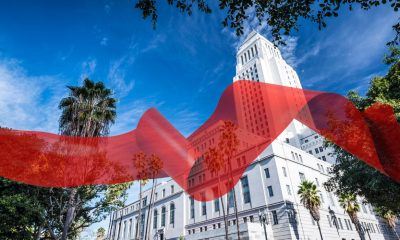
 Local14 hours ago
Local14 hours ago‘Housing Now!’: Advocates plan to wrap City Hall in red tape
-

 Features4 days ago
Features4 days agoNew mayor Chelsea Byers, hopes to make WeHo a model city for others to follow
-

 The Vatican17 hours ago
The Vatican17 hours agoPope Francis dies at 88





